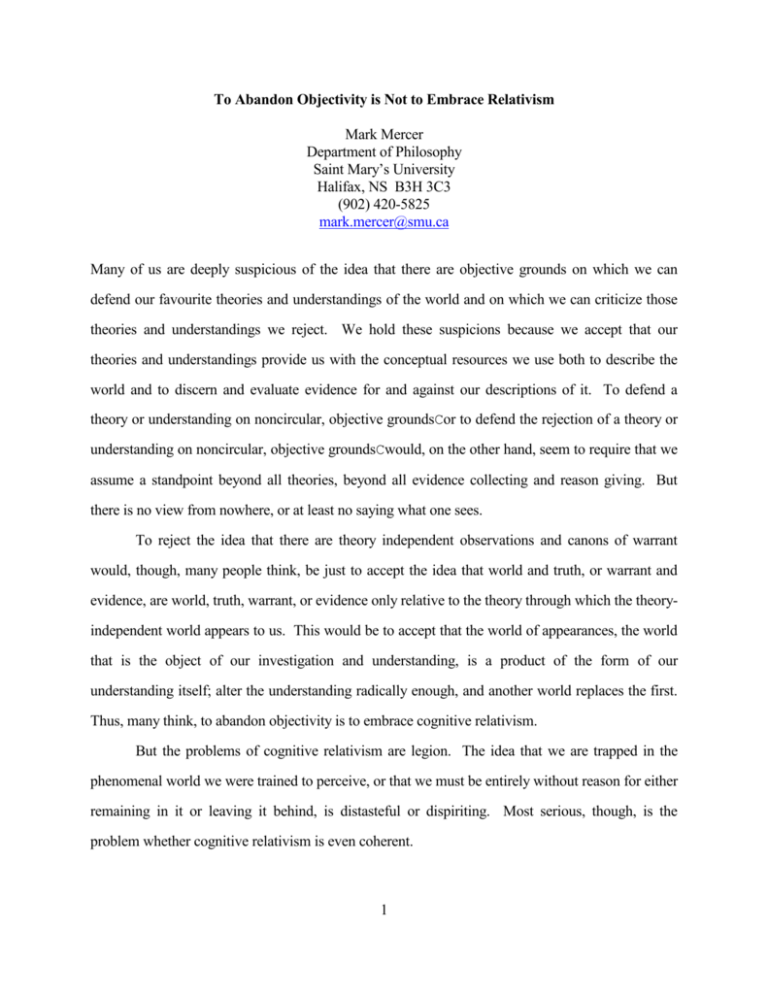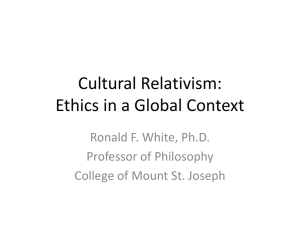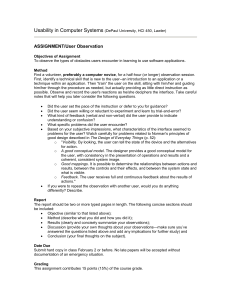To Abandon Objectivity is Not to Embrace Relativism
advertisement

To Abandon Objectivity is Not to Embrace Relativism Mark Mercer Department of Philosophy Saint Mary’s University Halifax, NS B3H 3C3 (902) 420-5825 mark.mercer@smu.ca Many of us are deeply suspicious of the idea that there are objective grounds on which we can defend our favourite theories and understandings of the world and on which we can criticize those theories and understandings we reject. We hold these suspicions because we accept that our theories and understandings provide us with the conceptual resources we use both to describe the world and to discern and evaluate evidence for and against our descriptions of it. To defend a theory or understanding on noncircular, objective groundsCor to defend the rejection of a theory or understanding on noncircular, objective groundsCwould, on the other hand, seem to require that we assume a standpoint beyond all theories, beyond all evidence collecting and reason giving. But there is no view from nowhere, or at least no saying what one sees. To reject the idea that there are theory independent observations and canons of warrant would, though, many people think, be just to accept the idea that world and truth, or warrant and evidence, are world, truth, warrant, or evidence only relative to the theory through which the theoryindependent world appears to us. This would be to accept that the world of appearances, the world that is the object of our investigation and understanding, is a product of the form of our understanding itself; alter the understanding radically enough, and another world replaces the first. Thus, many think, to abandon objectivity is to embrace cognitive relativism. But the problems of cognitive relativism are legion. The idea that we are trapped in the phenomenal world we were trained to perceive, or that we must be entirely without reason for either remaining in it or leaving it behind, is distasteful or dispiriting. Most serious, though, is the problem whether cognitive relativism is even coherent. 1 Objectivity or relativism? This question, as it has been debated within and without philosophy for the last few decades, is the question: which of the two is the least unpalatable? If the rejection of objectivity does, in fact, imply the acceptance of relativism, then we are forced to choose between modus tollens and modus ponens. But that whichever we choose, we end up with a doctrine beset by serious problems should, I think, incline us to investigate the premise common to both arguments. I hold that what is at fault here is precisely that premise, the claim that the rejection of objectivity implies the acceptance of cognitive relativism. It is entirely possible to abandon objectivity without embracing relativism, or at least so I will argue. My paper has three sections and a conclusion. I begin by explaining why objectivity, at least in one widespread, important conception, is untenable. I then describe cognitive relativism, as I understand it, and I present two challenges to its acceptability. I then spell out just what the rejection of objectivity means for our understanding of investigation, warrant, and rational debate between partisans of different understandings of the world, and I say why relativism is no part of this meaning. What is implied by the rejection of objectivity, I conclude, is that understanding is thoroughly hermeneutic and fallible. I hasten to add that my concern here is with objectivity and relativism about matters of factCwith, that is to say, objectivity and relativism about empirical description and theory. My concern is with what can be called cognitive objectivity and relativism, to distinguish them from both cultural and ethical objectivity and relativism. I suspect that my diagnosis, arguments, and conclusions, if they have merit, will bear on issues of cultural and ethical relativism, but it is far from clear to me just how. I: Objectivity The conception of objectivity I believe to be both widespread and untenable involves two theses: 1) Observations that provide evidence for or against claims do not, in some important cases, 2 presuppose the conceptual resources of any theory or understanding of the world; 2) Standards of epistemic warrantCstandards of, for instance, what rightly counts as evidence for whatCcan be evaluated independently of the theories in which they are found. The first thesis rests on the idea that there is a theory-independent level of perceptual belief, and supports the doctrine that using the univocal, unbiased evidence provided by these beliefs to evaluate an understanding of the world is tantamount to comparing that understanding with the independently existing world itself. According to this thesis, two observers, standing side by side, will form the same observational belief of an event they witness, whatever prior beliefs they might have had. Two behavioural scientists at a dinner party who disagree about the extent to which aggressivity colours human relations will, then, even should one be a sociobiologist while the other is a Jungian, agree that during that quick exchange that wife was or was not aggressive toward her husband; whatever disagreements they have about the event they observed together are not disagreements at the observational level, but rather disagreements at the level of their interpretations of there observational beliefs. The second thesis rests on the idea that there are canons of justification or warrant discoverable through a priori reflection, and supports the doctrine that a way of understanding the world can be criticized, without begging any questions, by properly criticizing the methods by which it was constructed. According to this thesis, one can divide systems of belief into the credible and the incredible, the scientific and the pseudoscientific, even before one seeks evidence for or against any of their particular empirical claims. One can know that the claims of the Jungian behavioural scientist at the dinner party can be ignored because we can know independently of empirical investigation that the world cannot be as the mystical Jungians say that it is; or one can know this about the claims of the reductive sociobiologist. Certainly, even were these theses true, adjudication between two competing understandings of the world would not necessarily be a simple matter. For instance, observational evidence might 3 at some points speak in favour of one theory and against the other, while at other points it might speak in favour of the other and against the one. Each behavioural researcher will concede that, at some points, the observational evidence favours the other’s theory. Nonetheless, given the second thesis, we could determine whether a theory is in the first place even potentially a system of warranted claimsCwe could determine, that is, whether or to what extent it is a science. Having discarded all pseudosciences and all disciplines not capable of the level of rigour possible for their subject matter, we would be in a position to describe a set of observations implied by each. By performing experiments or otherwise positioning ourselves to observe the world, we could, given the first thesis, determine of each theory just where it succeeds and where it fails. Neither thesis, however, is true. Each observation is the particular observation it is because of the conceptual resources that characterize the observer who made it. To speak of a theory independent observational belief is to speak of a belief prior to conceptualization. But if, on the one hand, any belief at all can be represented as a sentence held true, then there are no such beliefs. This is because sentences share terms with other sentences, and mean what they do because of their place in networks of believed sentences. And if, on the other hand, some beliefs that cannot be represented by sentences do exist, they must necessarily fail to serve as evidence. This is because a belief that lacks terms altogether can share no terms with the sentences that comprise the understanding of the world under evaluation. We must allow that even before they put interpretations on what they saw happen, our two scientists can part ways on the question whether the wife’s action manifested aggression. The second thesis, that methods of investigation and standards of warrant can be evaluated independently of the understandings in which they are found, is also false. Certainly an understanding of the world has to display a high degree of internal coherence, be sensitive to evidence, and much else besides, but this is because these features are what make something an understanding of the world in the first place; just how it is internally coherent, just what is to count 4 as evidence, will be specified by that understanding itself. The complaint that an understanding of the world is pseudoscientific, or ideologically drivenCor mystical or reductiveCcan be only the complaint that that understanding differs significantly from one’s favourite understanding or is driven by an ideology one rejects. II: Cognitive Relativism To discuss cognitive relativism one must first of all specify just what is relative to what, and then to specify just how it is relative to it. There are, I think, at least three candidates for what is relative to something else: they are knowledge, truth and reality. And there are at least four candidates for the something else one or more of knowledge, truth and reality is relative to: they are language, conceptual scheme, method of investigation, and style of reasoning. For the sake of simplicity, and since the concepts of truth and conceptual scheme each seem to include the concepts of their companions, I will take cognitive relativism to consist in the idea that the truth of sentences is relative to conceptual scheme. But in what does the relativity of truth to conceptual scheme consist? The claim that truth is relative to conceptual scheme, if that claim is to give content to the idea of cognitive relativism, cannot be merely the claim that only those possessed of a particular conceptual scheme are able to understand some claim or to appreciate whether it is true. Certainly no one lacking the conceptual scheme of contemporary naturalistic biology would understand the claim that some population of similar-looking fish includes two sister species, and thus no one lacking that scheme could begin to determine whether the claim in question is true. That a claim can be understood only by one possessed of the relevant concepts does not mean that the truth of that claim is relative to a conceptual scheme, but only that possessing those conceptsCwhatever possessing concepts might come toCis a necessary causal condition for understanding and 5 evaluating the claim. Cognitive relativism must consist of more than the idea that we are required to possess certain concepts if we are to be able to make sense of certain claims. What more I think it consists in is this: The conceptual scheme to which the truth of sentences is relative is a screen or filter that non-causally affects a world beyond description and, thereby, creates a phenomenal world to which the concepts of the scheme apply. A knowable reality, then, has the specific character it does because of the organization imposed on the raw material of the independently existing world by the scheme. That conceptual schemes create the worlds that investigators describe and understand is crucial to cognitive relativism. Traditions of inquiry and understanding are different if they differ in the methods and standards, the conceptual schemes, that make manifest their particular worlds. Now, because any evaluation of a claim about the world will appeal to some tradition’s methods and standards, traditions of inquiry cannot be objectively evaluated as epistemically good or bad. The truth or rationality of a claim is a matter internal to a tradition. Real dispute can occur within traditions, but not between them; between traditions there can be only respectful silence or ignorant bullying. An individual’s choice to work within one rather than another tradition cannot be based on his or her appreciation of its objective superiority, but instead only on idiosyncrases of personality and other non-rational factors. “Choice,” however, is the wrong word here, for it is always already too late to choose a tradition; before one is in a position to make any choice, one has to possess an understanding of the world and, thus, to be always already within a tradition. Now why would the rejection of objectivity, as described in Section I, be thought to imply that truth is relative to conceptual scheme? I think one chain of reasoning is this: Because there are no theory independent observations, two observers standing side by side but possessed of different understandings of the ways of the world will form different observational beliefs of the same event. Should these observational beliefs each be warranted according to the understanding through which it was acquired, and each understanding be in its own terms internally coherent, then neither 6 belief can be said to be false. Further, since each is warranted by the understanding of which it is a part, each belief is a piece of knowledge for the person who possesses it. For each to be a piece of knowledge, each must get some feature of the world rightCbut each might be inconsistent with the other, and that is impossible if each gets some feature of the same world right. They must not, then, be inconsistent after all; and they are not inconsistent if they are not really about the same event, about one event in one world, after all. They must be about different worlds, worlds brought into being by the understandings responsible for them. That cognitive relativism refutes itself might well be true, but I want to approach the claim that truth is relative to conceptual schemes from two other directions. First of all, I don’t think good sense can be made of the idea that conceptual schemes non-causally fashion phenomenal worlds out of a noumenal raw material. In order to know that a conceptual scheme is functioning to organize a raw material into a phenomenal world, we would have to witness it performing its work. But this is just what is ruled out by the claim that only that that has been fashioned by a conceptual scheme can be known. The explication of cognitive relativism in terms of the action of a conceptual scheme on an unknowable something is but an image we could never know applies to the world. Second, I think that the claim that truth is relative to conceptual schemes implies not only that there can be no good reasons for preferring one understanding of the world to another, but also that there could be utterances the meanings of which must in principle remain forever beyond the ken of otherwise competent interpreters. This implication there is good reason to believe is false. To imagine that there could be an utterance of a meaningful sentence that must in principle go uninterpreted by an interpreter is to imagine that something whose meaning can never be discerned can still be identified as an utterance. But if we could never interpret it, we could never know that it is meaningful. 7 Interpreting othersCattempting to discern what their words mean, what they mean by speaking their words, what they believe, what they desire, which movements of theirs are actions, what they are endeavouring to accomplish through their actionsCis empirical work. It requires hypothesis forming, hypothesis testing, theorizing. The interpreter attempts to describe, predict and manipulate the behaviour of the object of her attention. If it is impossible for her to do soCand not simply because she lacks skill or time or inclinationCit must be that there are no utterances there to describe as having meaning. Now, since the false claim that there could be an utterance that is, in principle, uninterpretable by an otherwise competent interpreter is implied by the claim that truth is relative to conceptual scheme, that claim too must be false. III: Abandoning Objectivity Let us begin our enquiry into why abandoning objectivity does not require that we embrace relativism by considering just what the fallout of abandoning objectivity is. If observation is not independent of theory and there is no a priori way to justify one theory over another, then two understandings of the world can be incommensurable with each other. Two understandings of the same range of phenomena can each, that is, be internally coherent according to its own standards of coherence while excluding the other. A person cannot, then, hold incommensurable understandings of the world to be true together. Moreover, if two particular understandings of the world are incommensurable with each other, then there will be no non-question-begging way to justify one’s acceptance of one and rejection of the other. The holder of a theory incommensurable with another is in a difficult spot with regard to evaluating that other theory. How is this not relativism? First of all, nothing in the abandonment of objectivity implies that understanding others is impossible. Understanding others is one thing, evaluating their beliefs, deciding that they are true or false, is another; the thesis that two theories can be incommensurable with each other is primarily a thesis about evaluation and adjudication, and only secondarily has implications for the issue of 8 understanding a theory. Failing to share a conceptual scheme can certainly make understanding difficult, but it need not make it impossible. The person to be interpreted is an object in the world to be theorized about, just as any other object is. An interpreter might very well lack conceptual resources needed to interpret some other, but this is not to be distinguished from lacking conceptual resources needed to understand any other natural phenomenon. In hypothesizing and testing hypotheses about the other, the interpreter can come to forge for herself the conceptual resources that will enable her to understand his sentences and his beliefs. Again, this is not to be distinguished from coming to have the conceptual resources needed to understand automobile ignition or photosynthesis. But couldn’t two people have conceptual schemes so radically different that they share no concepts at all and, thus, have no way to acquire the concepts through which the other understands the world? If so, wouldn’t that prevent them from ever coming to understand each other? These questions are confused. Yes, two people could have radically different conceptual schemes, perhaps so radically different that they share no concepts. But why should that prevent them from coming to share concepts? They might not understand each other at first, and their lack of shared concepts will require that they begin from scratch, that they begin, that is, by investigating each other’s nonlinguistic behaviour. More important, though, is the fact that understanding does not require the sharing of concepts. Indeed, most of the things we understandCweather patterns, primate evolutionChappen themselves not to possess any concepts and, thus, possess no concepts for us to share. The view that sharing concepts is required for understanding might well be called the correspondence theory of understanding; like the correspondence theory of truth, the correspondence theory of understanding is at best innocuous, but usually seriously misleading. It is innocuous if understanding another is taken to signal that concepts are shared, but misleading if it is supposed that two investigators can be known not to share concepts prior to their attempt to understand each other. Really, however, understanding consists in describing what the other 9 believes and what his sentences mean. Of course, one describes what the other believes and what his sentences mean using one’s own concepts; but this is no more necessarily to get the other wrong than using one’s own concepts to describe the table is necessarily to get the table wrong. There is no need for one’s concepts to correspond to those of the person whom one is attempting to understand. If, as I have argued, the idea that truth is relative to conceptual scheme implies that investigators possessed of radically different conceptual schemes could not come to understand each other, then, since the rejection of objectivity does not entail that communication must sometimes fail, the rejection of objectivity also does not entail that truth is relative to conceptual schemes. But perhaps, one might think, the rejection of objectivity entails at least that theory choice must be arbitrary, and that this is relativism enough. Now unless the idea that theory choice must be arbitrary is entailed by a position in which something is held to be relative to something else, then it is not itself a relativistic idea. I have argued that any position that does hold something to be relative to something else entails that communication must sometimes fail. Thus, if I am right, the rejection of objectivity would not entail relativism merely in virtue of entailing that theory choice must be arbitrary. However, the rejection of objectivity does not, in any case, entail that theory choice must be arbitrary, at least not in any important sense of “arbitrary.” A partisan of a theory can, in principle, have good reasons for holding it and for rejecting an incommensurable theory; she could also, of course, have good reasons for changing her mind. We should first distinguish between reasons for acting and reasons for believing. The former are belief and desire pairs, and they rationalize what we do, while the latter include evidence and other reasons why a claim is more likely true than is its negation. The idea that theory choice is arbitrary implies that we choose our theories, and this is ambiguous between choosing to bet on a theory, choosing, that is, to do something, and choosing to hold a theory, choosing, that is, to 10 believe something. Of course, we don’t, for the most part, choose what to believeCwe merely find ourselves believing with some degree of confidence. Thus, it is unclear how we could believe something arbitrarily. Still, we might believe irrationally, if we believe or doubt against our own epistemic standards. Even so, remaining within a theory or converting to an incommensurable one need not be the result of irrational thinking. By making further observations, reviewing evidence, and investigating other ways of understanding the world, we can be brought to lose beliefs we have and to acquire new ones. Our epistemic standards themselves can be brought into question by evidence we perceive to be recalcitrant. We might even find that, through piling on small doubts about our former way of understanding the world and accumulating small successes in trying on a new way, we have come to take that new way on as our own. Though there need be no nonqestion-begging way to argue that our new understanding is epistemically preferable to our old one, still, the road we travelled to it need not have been one marked by wishful thinking or denials of evidence and, thus, need not have been irrational. We can, of course, choose our theories in the sense of deciding to work using the concepts and strategies of one rather than another. Does the rejection of objectivity mean that this sort of choice must be arbitrary? NoCone can have very good practical reasons for betting on a theory and working within it; one can have good reasons even for ignoring criticism of one’s theory and the successes of a rival theory. One doesn’t, certainly, have to believe that a theory is more likely correct than a competitor in order to have good reason to devote oneself to it; one would have excellent reason to bet on it despite one’s epistemic evaluation of it should one think the payoff should it enjoy success would be greater than the payoff of the other should it enjoy success. Choosing one theory over an incommensurable other, in the sense of deciding to work within it rather than within the other, can be based on good practical reasons and, thus, not at all arbitrary. IV: Conclusion 11 The upshot of the rejection of objectivity, at least construed as I have construed it, is not relativism, but rather, I think, first, an appreciation of the hermeneutic nature of understanding, and, second, a radical fallibilism. Just as the world itself is an object of our investigation, so too are theories of the world, ways of understanding it, potential objects of investigation. To understand a theory of the world one must come to be able to work within that theory, to see the world through it. That a theory of the world is incommensurable with another is itself something that can be controversial. Two theories might not be incommensurable at all, despite first impressions, but rather variants of each other, or there might turn out to be spots at which they can be evaluated against the same evidence construed the same way. Two theories might even turn out to concern different ranges of phenomena and, thus, not to be in competition at all. An investigator might at any time find any of his or her ideas, about either the world or an understanding of it, questionable or doubtful. There might at any time appear a novel way of looking at the world from which other theories appear mistaken. Just how two theories are similar and different from each other is itself an issue requiring investigation, and further hermeneutical investigations might bring us to revise our formerly settled views. All this means, of course, that discussion and debate can, potentially, be interminable. But that is not to say that discussion or debate need ever be entirely impossible, or even to say that it will sometimes inevitably be mere gainsaying. 12





